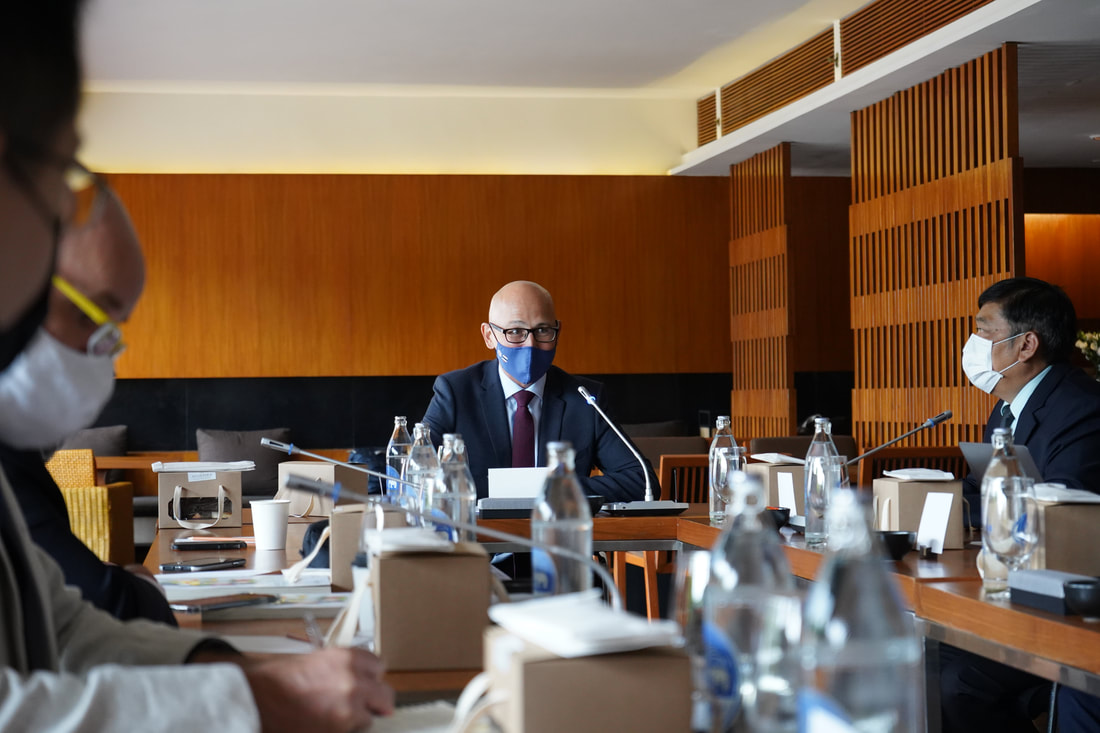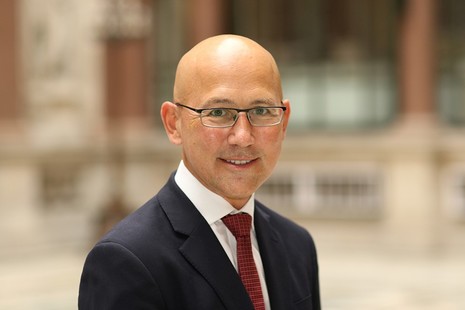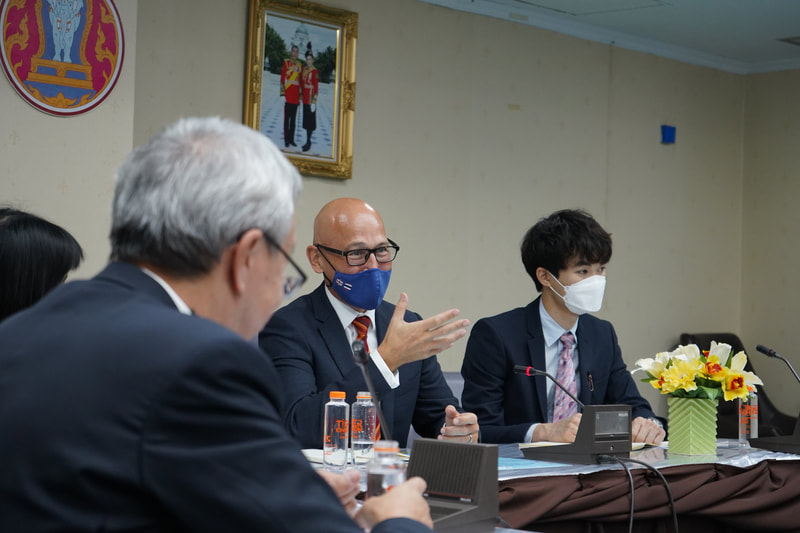Interview with new British Ambassador H.E. Mark Goodin
It wasn’t exactly the most auspicious of times when Mark Gooding took up his posting as Britain’s new Ambassador to Thailand at the beginning of July. The Covid-19 pandemic was arguably at its peak, with strict lockdowns and curfews, as well as tough restrictions on travel both domestically and overseas. Adding to the woes was confusion over which vaccines were acceptable for travel to the UK.
“When I arrived in July, there was an issue with many Brits having difficulty accessing vaccines in Thailand, so over the past four months we have worked with other embassies here and the Thai government to expand the vaccination programme and get foreigners, including British people, access to vaccines,” explained 46-year-old Mark.
Five months later, the situation has changed dramatically, with the majority of British nationals in Thailand now double-vaccinated, the acceptance of the four major vaccines - especially welcome after the inexplicable delay in registration of British vaccine AstraZeneca - and Thailand’s removal from the UK’s ‘red list’ enabling two-way travel between the countries.
“This shows that countries need to work together internationally, sharing information and ideas. Then we can limit the virus’s spread and help treat people who catch it.
“We’re working with the Ministry of Public Health to increase the volume of testing, not just in terms of total numbers but in the case of Thailand, the question is about testing for variants of concern.”
To underscore this trans-national approach, the ambassador points out that the UK donated 415,000 doses of Astra Zenicha vaccines to Thailand back in July. And he singles out the British Chamber of Commerce Thailand (BCCT) for its work on assisting Brits here to access vaccines. “The chamber is one of our links with the British community here, and they did a great job,” he said.
he ambassador comes to Thailand with exceptional credentials with considerable experience of the region. After earning a Master’s Degree in Modern Languages from Oxford University, he joined the Foreign and Commonwealth Office (FCO) in 1999, and has spent his career working mostly on Europe and Asia. His previous roles include Director Covid (Repatriations), Director EU (Future Partnership), and Deputy Director Europe, Minister Counsellor (Political) at the British Embassy in Beijing.
“When I arrived in July, there was an issue with many Brits having difficulty accessing vaccines in Thailand, so over the past four months we have worked with other embassies here and the Thai government to expand the vaccination programme and get foreigners, including British people, access to vaccines,” explained 46-year-old Mark.
Five months later, the situation has changed dramatically, with the majority of British nationals in Thailand now double-vaccinated, the acceptance of the four major vaccines - especially welcome after the inexplicable delay in registration of British vaccine AstraZeneca - and Thailand’s removal from the UK’s ‘red list’ enabling two-way travel between the countries.
“This shows that countries need to work together internationally, sharing information and ideas. Then we can limit the virus’s spread and help treat people who catch it.
“We’re working with the Ministry of Public Health to increase the volume of testing, not just in terms of total numbers but in the case of Thailand, the question is about testing for variants of concern.”
To underscore this trans-national approach, the ambassador points out that the UK donated 415,000 doses of Astra Zenicha vaccines to Thailand back in July. And he singles out the British Chamber of Commerce Thailand (BCCT) for its work on assisting Brits here to access vaccines. “The chamber is one of our links with the British community here, and they did a great job,” he said.
he ambassador comes to Thailand with exceptional credentials with considerable experience of the region. After earning a Master’s Degree in Modern Languages from Oxford University, he joined the Foreign and Commonwealth Office (FCO) in 1999, and has spent his career working mostly on Europe and Asia. His previous roles include Director Covid (Repatriations), Director EU (Future Partnership), and Deputy Director Europe, Minister Counsellor (Political) at the British Embassy in Beijing.
He was also British Ambassador to Cambodia, British Deputy High Commissioner to Sri Lanka and the Maldives, and Private Secretary to the Foreign Secretary.
He holds an OBE (Order of the British Empire) for his services to foreign policy after working in Sri Lanka during the last years of that country’s civil war. Mark speaks Mandarin Chinese, French, German, Spanish and Thai.
Mark is no stranger to Thailand, having first visited here in 1994 as a backpacker, “fell in love with the country” and has returned many times since for private and professional visits.
To prepare for his appointment as ambassador, he spent seven months learning Thai in Bangkok, Khon Kaen and Chiang Mai, and travelled extensively to get a feel for the country.
As the British Ambassador, he represents HM The Queen and the UK government in Thailand, and is responsible for the direction and work of the embassy and its consulates, including political work, trade and investment, press and cultural relations, and visa and consular services. As such, he is the “public face of the embassy,” a responsibility he takes with great pride, he says.
The embassy has a staff of 150 comprising diplomats and local employees, who work on a wide range of issues, including political, economy and trade, promoting British trade, sustainable development, science and digital, climate, sustainable development, press and cultural relations, as well as visa and consular services. With thousands of Thais studying in the UK, education is another major focal point.
Mark says his tenure as ambassador will be different from his predecessor, HE Brian Davidson, in several key areas, including greater emphasis on the Indo-Pacific. “Our ministers in the UK understand the importance of the region for better economic and security reasons. To strengthen this regional cooperation, the UK has just become an ASEAN Dialogue Partner give us greater access to this part of the world.
“In addition, the embassy will work closely with the Thai government on post-Covid recovery as well as strengthening our bilateral relationship, particularly in areas like security, organized crime, counter terrorism, science and digital, climate change and sustainable development,.
The ambassador recently met Thai PM Prayut Cha-o-On and Health Minister Anutin Charnvirakul to discuss relations between the two countries.
“We will have the first UK-Thailand joint economic and trade committee meeting as well as our regular Strategic Dialogue over the next few months. That will set the directions for our bilateral relationship over the years ahead.
“There are many other sectors where I think we can cooperate more in the years ahead.
“We already have a lot of health cooperation between the UK and Thailand, not just on Covid but also on other illnesses, health and genomics. That’s an area of real growth for us.”
One of the embassy’s main missions is Britain’s anti-climate change effort, especially in view of COP 26, the United Nations Climate Change conference, taking place in Glasgow, Scotland, this month. “Engaging with Thailand and other countries in the region on climate change is a big priority,” says Mark.
The embassy has a staff of 150 comprising diplomats and local employees. Key roles include political counselor, prosperity counselor, defence attaché, representatives of the Border Force and national crime agency.
A large consular team is engaged to help around 50,000 British nationals living in Thailand on all kinds of issues, including access to vaccines. “In any year we provide assistance to over 1,500 British people and difficult cases when people go missing, are hospitalized or, sadly, when they die. Our focus is on the most vulnerable. We also have some British nationals in prison here.”
Another 5,000 Brits benefit from the embassy’s document and notary services, says the ambassador.
onetheless, misconceptions among some Brits about the embassy’s role in other matters continue. “We do not give out money and we do not pay hospital bills,” comments Mark.
As a China specialist, having spent several years with the British embassy in Beijing, Mark is notably sanguine about that country’s often derided ‘Belt and Road’ project. “China’s foreign policy aims to fill the gap in infrastructure funding in neighboring countries,” he says, adding that, in theory, its partners should go into this “with clear eyes.”
As for the loss of the former British Embassy compound on Wireless, he says: “I recognize that many people are sad that we’ve moved from our former compound. I didn’t work there myself, but am happy to find that our new embassy provides a modern and enjoyable working environment.”
Mark also gives assurances that the famous statue of Queen Victoria, which once graced the former compound, will have pride of place in a specially built garden in the new development. He also confirms that
the developers are committed to rebuilding a replacement
ambassador’s residence as part of the project.
Since arriving here, Mark has visited Chiang Mai where he met the governor to discuss cooperation in providing assistance to local Brits, as well as trade and sustainable development. He also spent time looking around the Foreign Cemetery, accompanied by some 50 of the city’s foreign residents.
In his spare time, he enjoys running, music and travelling. He used to sing in a choir in England. Mark is married to Dr Christopher McCormick, an education specialist.
Interview by Colin Hasting
He holds an OBE (Order of the British Empire) for his services to foreign policy after working in Sri Lanka during the last years of that country’s civil war. Mark speaks Mandarin Chinese, French, German, Spanish and Thai.
Mark is no stranger to Thailand, having first visited here in 1994 as a backpacker, “fell in love with the country” and has returned many times since for private and professional visits.
To prepare for his appointment as ambassador, he spent seven months learning Thai in Bangkok, Khon Kaen and Chiang Mai, and travelled extensively to get a feel for the country.
As the British Ambassador, he represents HM The Queen and the UK government in Thailand, and is responsible for the direction and work of the embassy and its consulates, including political work, trade and investment, press and cultural relations, and visa and consular services. As such, he is the “public face of the embassy,” a responsibility he takes with great pride, he says.
The embassy has a staff of 150 comprising diplomats and local employees, who work on a wide range of issues, including political, economy and trade, promoting British trade, sustainable development, science and digital, climate, sustainable development, press and cultural relations, as well as visa and consular services. With thousands of Thais studying in the UK, education is another major focal point.
Mark says his tenure as ambassador will be different from his predecessor, HE Brian Davidson, in several key areas, including greater emphasis on the Indo-Pacific. “Our ministers in the UK understand the importance of the region for better economic and security reasons. To strengthen this regional cooperation, the UK has just become an ASEAN Dialogue Partner give us greater access to this part of the world.
“In addition, the embassy will work closely with the Thai government on post-Covid recovery as well as strengthening our bilateral relationship, particularly in areas like security, organized crime, counter terrorism, science and digital, climate change and sustainable development,.
The ambassador recently met Thai PM Prayut Cha-o-On and Health Minister Anutin Charnvirakul to discuss relations between the two countries.
“We will have the first UK-Thailand joint economic and trade committee meeting as well as our regular Strategic Dialogue over the next few months. That will set the directions for our bilateral relationship over the years ahead.
“There are many other sectors where I think we can cooperate more in the years ahead.
“We already have a lot of health cooperation between the UK and Thailand, not just on Covid but also on other illnesses, health and genomics. That’s an area of real growth for us.”
One of the embassy’s main missions is Britain’s anti-climate change effort, especially in view of COP 26, the United Nations Climate Change conference, taking place in Glasgow, Scotland, this month. “Engaging with Thailand and other countries in the region on climate change is a big priority,” says Mark.
The embassy has a staff of 150 comprising diplomats and local employees. Key roles include political counselor, prosperity counselor, defence attaché, representatives of the Border Force and national crime agency.
A large consular team is engaged to help around 50,000 British nationals living in Thailand on all kinds of issues, including access to vaccines. “In any year we provide assistance to over 1,500 British people and difficult cases when people go missing, are hospitalized or, sadly, when they die. Our focus is on the most vulnerable. We also have some British nationals in prison here.”
Another 5,000 Brits benefit from the embassy’s document and notary services, says the ambassador.
onetheless, misconceptions among some Brits about the embassy’s role in other matters continue. “We do not give out money and we do not pay hospital bills,” comments Mark.
As a China specialist, having spent several years with the British embassy in Beijing, Mark is notably sanguine about that country’s often derided ‘Belt and Road’ project. “China’s foreign policy aims to fill the gap in infrastructure funding in neighboring countries,” he says, adding that, in theory, its partners should go into this “with clear eyes.”
As for the loss of the former British Embassy compound on Wireless, he says: “I recognize that many people are sad that we’ve moved from our former compound. I didn’t work there myself, but am happy to find that our new embassy provides a modern and enjoyable working environment.”
Mark also gives assurances that the famous statue of Queen Victoria, which once graced the former compound, will have pride of place in a specially built garden in the new development. He also confirms that
the developers are committed to rebuilding a replacement
ambassador’s residence as part of the project.
Since arriving here, Mark has visited Chiang Mai where he met the governor to discuss cooperation in providing assistance to local Brits, as well as trade and sustainable development. He also spent time looking around the Foreign Cemetery, accompanied by some 50 of the city’s foreign residents.
In his spare time, he enjoys running, music and travelling. He used to sing in a choir in England. Mark is married to Dr Christopher McCormick, an education specialist.
Interview by Colin Hasting




 RSS Feed
RSS Feed
















